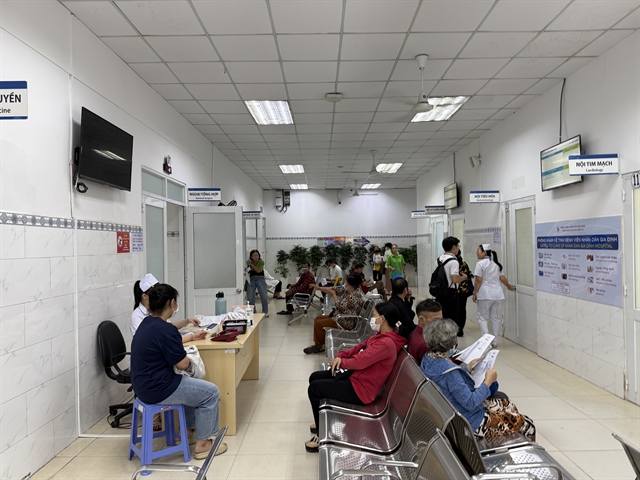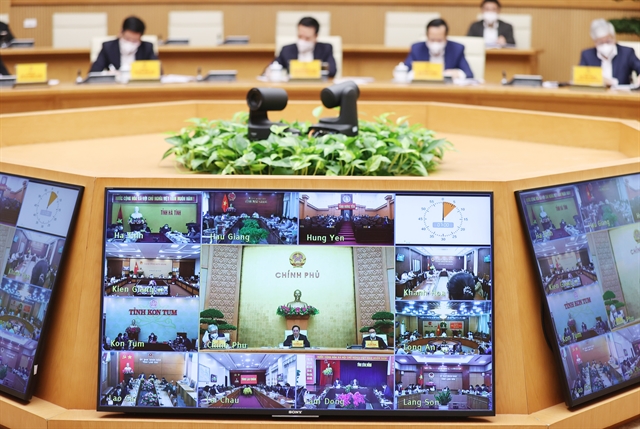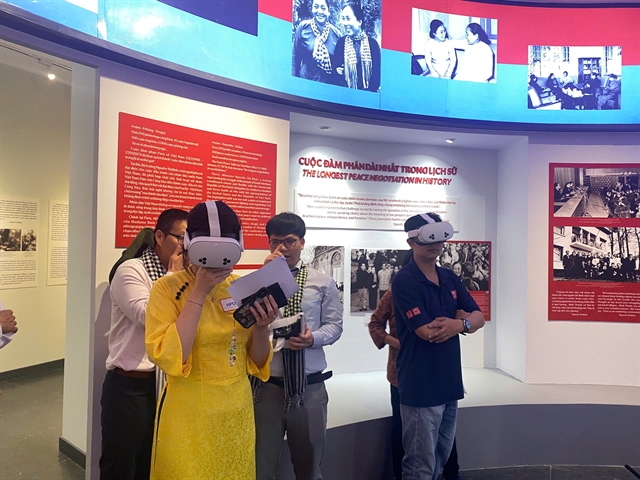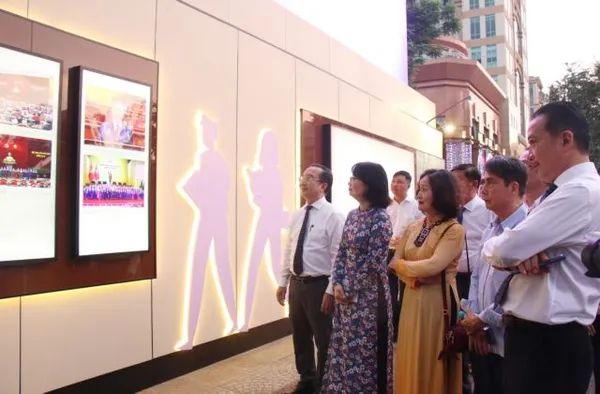 Society
Society

Prime Minister Phạm Minh Chính outlined the vaccination roadmap when chairing a national online meeting on COVID-19 prevention and control on Friday.

|
| PM Phạm Minh Chính chairs an online national meeting on COVID-19 prevention and control on Friday. — VNA/VNS Photo Dương Giang |
HÀ NỘI — All people aged over 18 years old in Việt Nam are expected to get a second dose of a COVID-19 vaccine by the end of this year, Prime Minister Phạm Minh Chính said on Friday.
By the end of the first quarter of next year, adults in the country will all receive third vaccine doses with priority being given to frontline workers, people aged over 50 years old and those with underlying health conditions.
By the end of January next year, all children aged from 12 to 18 will be fully vaccinated against COVID-19.
The Government leader outlined the vaccination roadmap when chairing a national online meeting on COVID-19 prevention and control with all State agencies and country's localities.
Regarding the COVID-19 inoculation drive for younger children aged from five to 12, he asked for consultation of relevant authorities, international experience and recommendations to develop detailed goals and a roadmap. He expected that the vaccination drive for younger children would be completed in the first quarter of next year.
At the meeting, participants agreed that the Government’s Resolution 128 with guidelines on safe adaptation, flexibility and effective control of the COVID-19 pandemic has proven effective after two months of implementation. The COVID-19 pandemic across the country is under control, while the socio-economic situation has gradually recovered in all fields. Schools are gradually reopening by combining online and in-person learning.
The Prime Minister applauded efforts and support of COVID-19 prevention and control committees at all levels, people and businesses in the COVID-19 fight, particularly after Resolution 128 was adopted.
However, in recent days, the number of daily new cases was increasing and more COVID-19 related deaths were reported in some localities.
Shortcomings and limitations remained in some places, as people are still negligent and lack vigilance. They also do not understand the effectiveness of the vaccine, Chính said.
Most of the severe cases and deaths were among unvaccinated people or those with underlying medical conditions. As the capacity of preventive medicine and grassroots healthcare have not been improved, patients still face limited access to healthcare. The progress of vaccination has not yet reached the desired level although Việt Nam’s COVID-19 vaccination progress is highly appreciated by international organisations.
“The pandemic is complicated in some places and risks have not been managed because local authorities have not effectively implemented health measures and others,” Chính said.
As the pandemic would continue developing, the Prime Minister called for early warnings and solutions to cope with arising issues.
He also noted difficulties and challenges in socio-economic recovery and development, social security and the emergence of new virus strains, particularly Omicron.
“More efforts should be made in restoring the labour market and overcoming shortages, especially in large industrial zones.”
“When adapting safely, flexibly and effectively to the pandemic, it must go along with risk control, minimising the number of severe cases and deaths,” Chính said.
Among key focuses, Prime Minister Chính highlighted the importance of keeping calm and vigilant during the pandemic, improving public awareness on COVID-19 prevention and control for personal and community health.
He asked for perfections to Resolution 128 in the spirit of safety, flexibility, effective disease control in accordance with specific developments over virus variants.
Resolution 128 must be implemented consistently across the country together with three pillars of disease prevention including isolation, testing and treatment. Việt Nam still keeps the combined formula of 5K, vaccine, medicine, technology and public awareness.
Chính asked the Ministry of Health to soon provide guidance on COVID-19 self-testing.
The Prime Minister said that localities must not issue measures that are against the regulations of the central Government.
If they implement regulations that are different from the general principles of the central Government or find Government measures are not suitable with their circumstances, they should immediately report to the central steering committee for supplementation and adjustment.
“The Government and the Central Steering Committee on COVID-19 Prevention and Control are always open to adjust and improve measures,” he said.
PM Chính also asked for ramping up COVID-19 vaccination. People who don’t want to get vaccinated would be responsible for their decision, for example, paying for medical costs in case they are infected with SARS-CoV-2.
“The supply of vaccines and vaccination staff must be ensured,” he said, also asking for sufficient supply of drugs for COVID-19 treatment.
He asked relevant agencies to create favourable conditions to promote the research, technology transfer, testing and domestic production of vaccines and drugs to treat COVID-19.
The Prime Minister requested agencies to advise and implement the re-opening of international flights to ensure safety, according to the conclusion of Permanent Deputy Prime Minister Phạm Bình Minh at a meeting on December 9.
Minister of Health Nguyễn Thanh Long said that the pandemic had been basically controlled nationwide. However, the number of community cases and deaths continued to increase in localities, especially in the past week, with 40 provinces and cities seeing increased numbers of community cases.
“The disease has been circulating in the community. There is a risk of new outbreaks that could occur at any time, especially in localities with high population density, busy trade and travel,” Long said.
“It is necessary to continue to strengthen disease prevention and control measures, especially surveillance for early detection, treatment and reduction of severe illness, mortality and ramp up vaccinations as winter-spring weather creates favourable conditions for the spread of the virus, let alone increased trade and travel during the New Year, the Lunar New Year and the risk of new strains,” he said.
Long also warned about negligence of people in following disease prevention and control requirements as social distancing measures were eased.
Regarding COVID-19 vaccinations, Long said that so far, Việt Nam signed contracts to purchase and receive 211 million doses of COVID-19 vaccines.
The country has received over 157 million doses, of those 143.4 million doses have been allocated while another 13 million doses were undergoing quality checks.
About 131 million doses have been administered. At least 96.4 per cent of the country’s adult population had received a first dose and 76.5 per cent received second doses.
There are 57 provinces and cities implementing COVID-19 vaccinations for children aged 12-17 with 6.4 million doses administered. First-dose coverage reached 57.3 per cent and second-dose coverage reached 12.7 per cent of the population aged between 12-17.
According to the health ministry, the functional agencies continue to direct and guide localities to proactively implement measures to improve the capacity of patient treatment. Sixteen central hospitals have been assigned to provide professional support for southern provinces.
This week, the Ministry of National Defense has arranged 417 doctors and nurses and established 139 more mobile medical teams for localities in Military Region 7 and Military Region 9.
By Wednesday, 55 provinces and cities had issued a plan to implement Resolution No. 128/NQ-CP on safe and flexible adaptation to the COVID-19 pandemic.
Currently, 846 communes and wards, accounting for eight per cent of total wards/communes in Việt Nam are high-risk areas (level three), 218 communes and wards are very-high-risk areas (level four). The number of wards/communes at level three increased by 211 while the number of wards/communes at level four decreased by 15 compared to last week. — VNS




